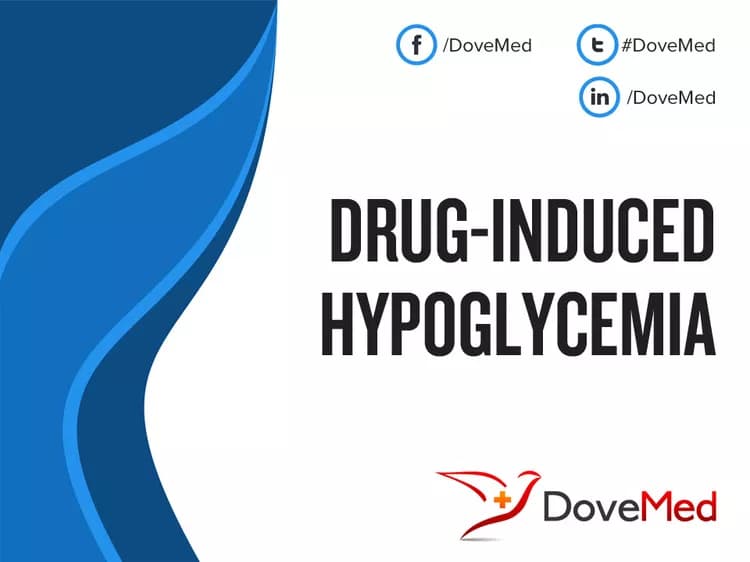What are the other Names for this Condition? (Also known as/Synonyms)
- Drug-Induced Low Blood Glucose
- Medication-Induced Hypoglycemia
- Medication-Induced Low Blood Glucose
What is Drug-Induced Hypoglycemia? (Definition/Background Information)
- Drug-Induced Hypoglycemia is a condition when blood glucose level drops below 70 mg/dL in response to certain types of medication
- Alcohol, excessive physical activity, and overdosing on diabetic medications are risk factors for Drug-Induced Hypoglycemia. The condition is caused by several types of drugs, including bactrim, beta-blockers, insulin, and MAO inhibitors
- The signs and symptoms of Drug-Induced Hypoglycemia may include anxiety, hunger, and irritability. In case of severe complications, it may lead to coma and brain damage
- Drug-Induced Hypoglycemia is treated by administering an individual with glucose, in order to raise their blood glucose levels. The prognosis is good, if the condition is treated in a prompt manner
- Drug-Induced Hypoglycemia can be prevented in non-diabetic individuals by avoiding drugs intended to reduce blood glucose levels, as well as through proper management of diet and exercise in individuals with diabetes
Who gets Drug-Induced Hypoglycemia? (Age and Sex Distribution)
- Drug-Induced Hypoglycemia can occur in individuals of all age groups
- Both males and females can be affected
- The condition can occur in all races and ethnicities
What are the Risk Factors for Drug-Induced Hypoglycemia? (Predisposing Factors)
There are several risk factors that predispose individuals to Drug-Induced Hypoglycemia, and these include:
- Drinking alcohol
- Excess physical activity
- Overdosing on medications used to treat diabetes; the unregulated use of prescription medication without a medical indication (such as the use of sulfonylureas)
- Missing or skipping meals
What are the Causes of Drug-Induced Hypoglycemia? (Etiology)
The direct cause of Drug-Induced Hypoglycemia is the unregulated use of one of several types of medications that cause blood sugar levels to drop. Most cases are observed, when an individual who does not have diabetes takes medications, which are used to treat diabetes.
In some cases, drugs unrelated to diabetes treatment can also cause a drop in blood sugar in the body. These medications include:
- Bactrim (an antibiotic)
- Beta-blockers
- Haloperidol
- Insulin
- MAO inhibitors
- Pentamidine
- Quinidine
- Sulfonylureas
The unregulated use of drugs, such as insulin and sulfonylureas (intended to control blood glucose levels in individuals with diabetes), disrupts the body’s use of glucose in blood, and causes it to drop to very low levels, leading to Drug-Induced Hypoglycemia.
What are the Signs and Symptoms of Drug-Induced Hypoglycemia?
Drug-Induced Hypoglycemia has several signs and symptoms, which may include:
- Anxiety
- Hunger
- Irritability
- Nightmares
- Numbness or tingling of the skin
- Palpitations
- Shakiness
- Sweating
How is Drug-Induced Hypoglycemia Diagnosed?
Diagnosing a case of Drug-Induced Hypoglycemia may involve the following procedures:
- A complete medical history and a thorough physical examination
- Creating a list of current medications being used and analyzing if any one (or more) of the drugs cause Drug-Induced Hypoglycemia
- Using a glucose meter to measure blood glucose levels: If the levels are below 70 mg/dL, then the individual is considered hypoglycemic
- Sometimes, individuals without diabetes may also show low blood glucose levels and may test positive for sulfonylureas
Many clinical conditions may have similar signs and symptoms. Your healthcare provider may perform additional tests to rule out other clinical conditions to arrive at a definitive diagnosis.
What are the possible Complications of Drug-Induced Hypoglycemia?
Some severe complications of Drug-Induced Hypoglycemia can include:
- Convulsions
- Brain and neurologic damage
- Coma
How is Drug-Induced Hypoglycemia Treated?
- Drug-Induced Hypoglycemia is treated by providing the affected individual with glucose to elevate their glucose level
- The drug causing the condition should be stopped immediately
- Changing the medications used to a different category of drugs, to treat the underlying condition (i.e., use of medications that do not cause hypoglycemia)
- Correcting the timing and dose of medications, as necessary (in individuals who have been diagnosed with diabetes and are taking medications for the same)
How can Drug-Induced Hypoglycemia be Prevented?
There are simple methods of preventing Drug-Induced Hypoglycemia and these include:
- Individuals, who are without diabetes, should avoid taking drugs intended for individuals with the condition
- Individuals with diabetes should maintain strict control of their blood sugar levels through appropriate diet, exercise, and regular blood sugar testing
What is the Prognosis of Drug-Induced Hypoglycemia? (Outcomes/Resolutions)
- If Drug-Induced Hypoglycemia is promptly treated, the outlook of the condition is very good
- However, long-term or repeated episodes of the condition can lead to damage of the nervous system
- Prolonged hypoglycemia with severe symptoms may result in poor prognosis
Additional and Relevant Useful Information for Drug-Induced Hypoglycemia:
- Type 2 diabetes is a chronic disease in which the blood contains high levels of glucose (sugar), the body’s main source of fuel
The following link may help you understand type 2 diabetes:
Related Articles
Test Your Knowledge
Asked by users
Related Centers
Related Specialties
Related Physicians
Related Procedures
Related Resources
Join DoveHubs
and connect with fellow professionals


0 Comments
Please log in to post a comment.